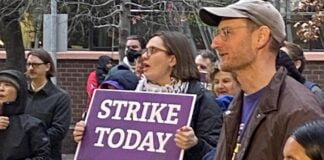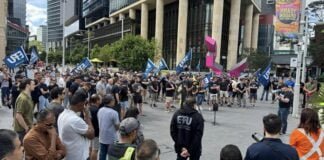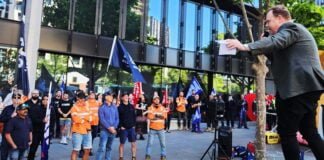A federal magistrates’ court verdict is overdue for Bob Carnegie, a union and community activist who faces 18 contempt of court charges. Justice Burnett told Bob to expect a verdict in late May or early June, but as Solidarity goes to press there is still no word.
Construction unions took strike action in February during Bob’s trial and have talked of further action if he is jailed. This needs to involve serious national strikes to have an impact.
The charges arise from Bob’s role in organising solidarity with 600 construction workers during a nine-week strike at the Queensland Children’s Hospital last year.
The dispute began when a plastering contractor went bust leaving 100 workers on the site without jobs or entitlements. Abigroup, the principle builder, refused to negotiate with the union about looking after these workers and was adamant they’d just bring in another subcontractor to finish the work.
While Abigroup ran the site, they only employed two non-supervisory workers. All work was outsourced to subcontractors, which bid against each other, driving down the rate. Contractors often tender too low and then go bust, leaving workers out of pocket.

Workers on the site were not about to see 100 of their workmates treated this way and walked out on strike to establish decent industry standards. They demanded a union enterprise agreement with Abigroup that included a clause ensuring all subcontractors would be paid the same rate for the same work.
But Abigroup did everything they could to resist these demands. This included the extensive use of the law to try and break the strike.
Union officials from the CFMEU, BLF, ETU, and Plumbers’ Union received court orders banning them from the site and from speaking to workers within 100 metres of it. Abigroup also set up cameras to constantly monitor activities at the site entrances. Individual rank and file workers, too, received court injunctions.
This is where Bob Carnegie, a long time rank and file seafarer and a former organiser with both the MUA and BLF, played a crucial role. He stepped in to help organise the dispute, re-badged as a “community protest” to get around anti-strike laws.
Regular meetings in the nearby Serbian community hall made sure the workers had control of the dispute. Their determination and solidarity only grew as the dispute progressed.
Getting support from other workers too was crucial and transport, maritime and mine workers, as well as community activists, raised money. When one worker’s son was diagnosed with leukemia, MUA workers volunteered to pay his rent.
The dispute began to spread to other building sites. A turning point came when strikes began to effect other companies owned by Lend Lease, Abigroup’s parent company. There was a national strike of construction workers in Baulderstone’s, owned by Lend Lease, in September.
The outcome was a victory for the workers. Abigroup negotiated a union enterprise agreement that included a clause covering subcontractors.
This was a victory for all construction workers. Shortly after, other major construction companies offered to negotiate union Enterprise Bargaining Agreements too.
While charges against individual workers on the site were dropped, Bob was singled out. Within 36 hours of the conclusion of the dispute he faced 54 counts of breaching court orders and a civil case for damages.
This was later reduced to 18, but they still carry serious consequences including massive fines, damages and even the possibility of a jail sentence.
Anti-strike laws
The attack on Bob is part of broader attack on the unions’ ability to challenge anti-strike laws. Construction unions in Victoria were recently found guilty of five counts of contempt for failing to comply with court orders to end the blockade of Grocon’s Emporium and McNab construction sites last year. Their penalty could run into the millions of dollars.
Anti-strike laws, first introduced by the Hawke Keating government but strengthened under Howard, and maintained by Rudd and Gillard, make it almost impossible for workers to effectively fight for their rights. Unions have often looked for ways to dance around these laws with “community protests” like at Abigroup. But increasingly governments and employers are trying to tighten the noose.
This means unions face two choices: either abide by the law and cease to be effective, or defy the law. The lesson from the Queensland Hospital dispute is that the law can be successfully defied if the dispute is well organised, rank and file members are involved and solidarity action is delivered.
The same sort of defiant campaign will be necessary to defend Bob Carnegie—and key to making sure unionists aren’t intimidated out of taking effective strike action in future.
By Mark Gillespie





